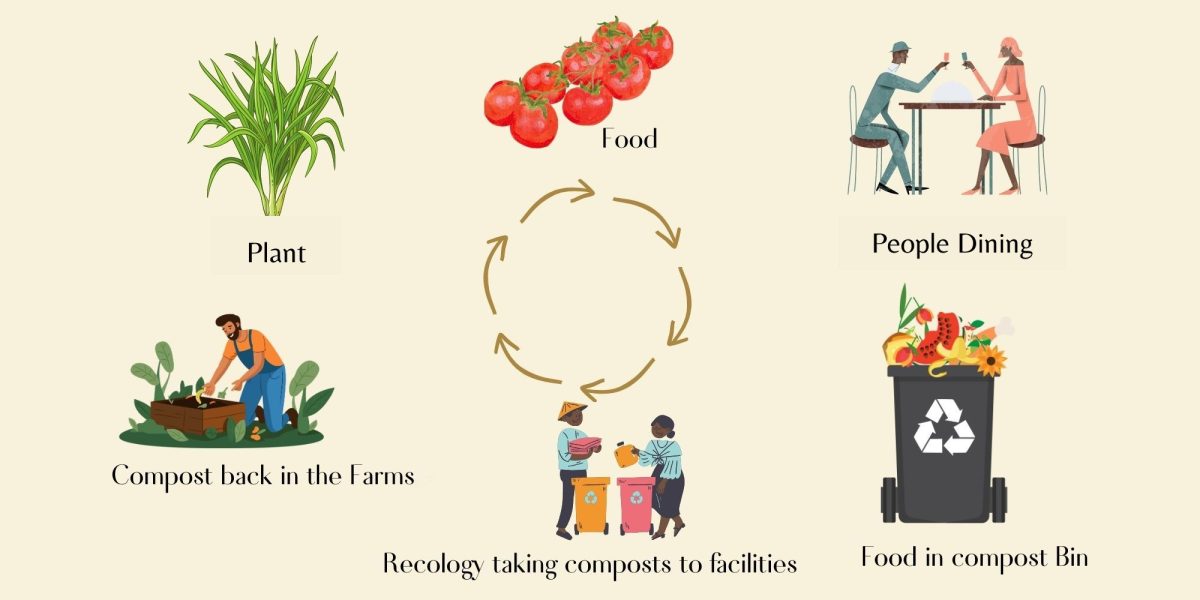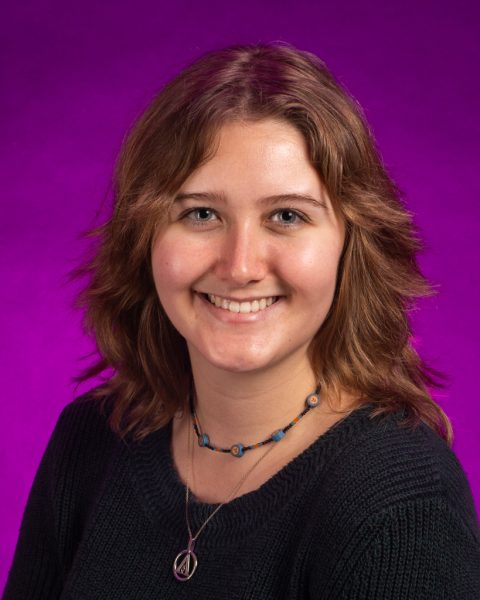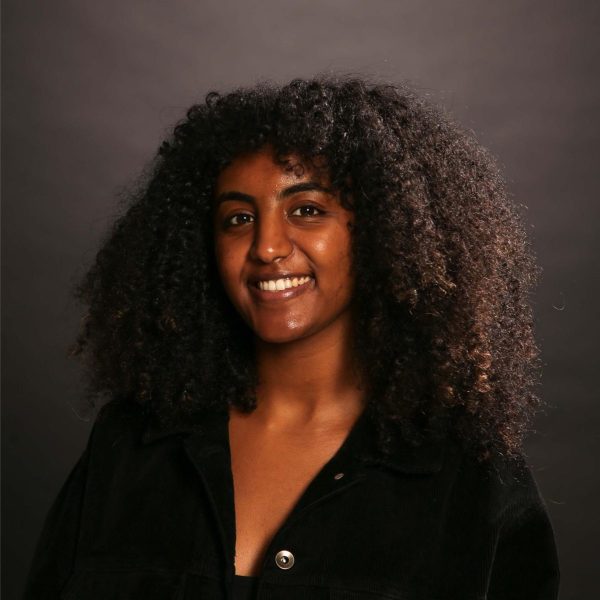As students get out of classes, they may be hungry. Chatting with some friends and deciding to go and get food from one of the campus vendors, they make their way out of the classroom. Walking over to one of the vendors, they order a salad.
After sitting and eating with their friends, they throw away the remainder of their food, but which bin does each piece of the salad go into? The black, green or blue bin? The student goes to throw the salad bits into the green bin and throws away the clamshell in the recycling.
That salad, once thrown into the compost bin, gets taken by Recology, (3) a company that takes the recycling and composting from San Francisco State University and other places around the city.
Once the salad has been collected, it gets moved to one of their trucks and sent off to Vernalis, where the food scraps are sent through a sorting process and composting begins.
Compost is a soil amendment that adds back to the soil. This process takes food scraps and recycles them into food for the soil. Composting also changes the characteristics of the soil and gives it a flora of microbiomes to the soil, which aids in the growing process.
The compost produced from San Francisco State University and San Francisco as a whole is sent to farmers who produce food for San Francisco and surrounding areas.
To help be more sustainable, some restaurants and vendors have begun to use compostable containers, but do they work? Does SFSU have compostable boxes? Some “compostable” boxes have plastic lining, which is not compostable and can hurt your compost. These boxes may also take longer to break down than other scraps found in composting.
Composting has been around for a very long time. Now, more of California is being required to compost their food waste.
Christian Levaggi is a senior zero waste coordinator at Recology. Levaggi first gained his interest in alternative energy in college. After working for an internship after college, he came across the Diablo Canyon Nuclear Reactor pitch. The reactor never got built because of the protests from recyclers and others. The predecessor of Recology hired him afterward, and he has been recycling and composting ever since.
“I basically have the obligation and opportunity to work with some of our largest generators, like San Francisco State, and the Giants and the Warriors and big office buildings and large hotels, to help them carve out paths of higher recycling rates, composting rates and lower contamination levels so there’s less garbage,” Levaggi said. “We also provide a financial incentive to do that. For example, with SF State, the more they can recycle and compost and have less garbage, they get a progressively larger discount. So they’re financially incentivized to do the right thing.”
Levaggi is not a fan of any single-use disposable of any type, even if it is compostable.
“Call me a dork, I bring my spork,” Levaggi said. “I’m not gonna take a single-use disposable fork, even if it’s certified compostable. It’s still a lot of embedded energy there.”
Even if these compostable containers say they are compostable, it takes different time frames for other products to break down and may not always be truthful.
Paperboard compostable boxes break down well, but plastic compostable containers rarely do within a 180-day timeframe.
“There’s concern on some of the paperboard stuff that has the waterproofing on it, of being impermeable, but it’s also like a long chain molecule that doesn’t break down and has some endocrine disruptor issues,” Levaggi said. “So [the] EPA is looking at those pretty carefully. So again, these little single-use convenience disposable options aren’t really the thing for the environment.”
SFSU has an office of sustainability that works with different departments on campus to ensure SFSU is the most sustainable it can be.
Caitlin Steele is the director of sustainability and energy and has been working on campus for 15 years.
“We organize a lot of projects that encompass a wide range of sustainability themes. So some of our projects are on zero waste, some are on transportation demand management, others are on water conservation or energy efficiency,” Steele said. “We’re always working with students on more education in the realm of sustainability and climate justice and social justice.”
The office of sustainability, while only two people large, gets involved with the entire SFSU campus. Office member Taylor Mogavero, the climate action coordinator, who assists Steele in working with different parts of campus.
“We just really want SF State to be the healthiest and most sustainable that it possibly can be for the health of our community,” Mogavero said. “Also, just the betterment of education comes along with living in a better environment.”
While no compostable take-out containers are offered at SFSU, the sustainability office works closely with Sodexo, which runs the dining hall on campus, City Eats.
HeeBong Hyun is the general manager for Sodexo, the company that runs City Eats, and works with the employees to run their reusable take-out boxes.
“For students who may want to take their meals to go, they can use [a] Green To Go container,” Hyun said. “They are given a key ring to retrieve washed/sanitized container[s] when they are ready to drop off dirty ones. We clean and sanitize dirty ones in our dish machine to ensure they are properly cleaned and sanitized.”
Although SFSU has no compostable boxes, others do.
Rich Lee owns SPRO Coffee Lab, a coffee shop in the city. Lee switched his businesses’ take-out containers to compostable containers to save the turtles.
“I saw a bunch of turtles choking or got stuff lodged in their throats, I think it was plastic straws or something like that,” Lee said. “Ever since then, I just said no more plastic straws or plastic stuff.”
While Lee pays a higher price for compostable containers over regular to-go products, his conscience is clear while he maintains his business.
“I just try my best to keep the business running while still reducing waste. That’s [the] main reason for me to switch to compost,” Lee said. “I have no idea whether or not these new compostable straws are gonna save the turtles but that is what made me, not emotional, but something [that] drives me to do better.”









